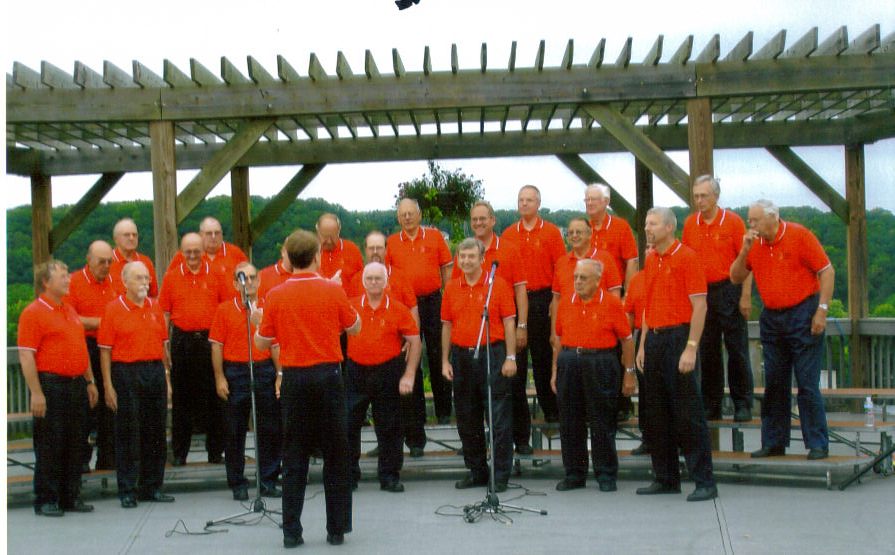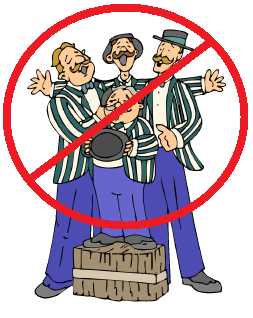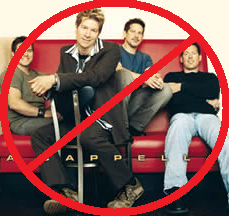If you are interested in booking us for your event, please contact us here. We're available and rates are reasonable!
The barbershop style originated as an informal, recreational form of singing. Guys hanging around at a tavern, at the park, or even - no kidding - at the barbershop - would harmonize to popular songs of the day. Back then popular music fell quite naturally into four-part voicing. And so, the Barbershop Quartet was born! You can find some free samples of the music here, on youtube, soptify, and all over the web.
There's still a lot of harmony going around. You can find some good links here, as well as some general information about singing four part barbershop-style harmony.
Since October of 2017, I've had the privilege of directing this group.
On October 4th, 2024, we will put on our 66th annual show. The culmination of each year is our October performance. The first half of the show features the chorus and our member quartets. Then we bring our the guest quartets - usually a local group of high caliber, as well as a quartet that's made a world-class name for itself. Come find out more! For information email me or go to the chorus site.
The Indianhead Chorus is a chapter of the Barbershop Harmony Society, with members from the 'Indianhead' region of northwestern Wisconsin, mainly Polk and Burnett Counties. (Members also come from Barron Co., and there's even few guys from across the river in Minnesota.)
Back in the mid fifties, a handful of men got together to sing some old-time harmonies. They liked it so well, they recruited some others, and fifty years later we're going strong. Of course that was before my time, but a few of the charter members are still around, and singing out strong.
We've got about twenty-five members now, and we're all there because we love it. I've done a lot of choral singing, and I've never had so much fun. No, it's not the Mormon Tabernacle Choir - they should be so lucky.
 Here we are singing in the 'triangle' park
in Luck, Wisconsin, in honor of the 100th anniversary of the town's
incorporation. The chorus sings for a variety of functions around Polk & Burnett
Counties.
We perform for county fairs, community arts programs, church services, and sundry
other events.
Each October, we put on our annual Harvest of Harmony .
For over thirty years, the show was warmly hosted by the Unity High School in Balsam Lake, WI.
In 2012 we moved to the Amery High School Auditorium. With Unity's new performance
center, we're looking into possibilities. Check the Chorus website
Here we are singing in the 'triangle' park
in Luck, Wisconsin, in honor of the 100th anniversary of the town's
incorporation. The chorus sings for a variety of functions around Polk & Burnett
Counties.
We perform for county fairs, community arts programs, church services, and sundry
other events.
Each October, we put on our annual Harvest of Harmony .
For over thirty years, the show was warmly hosted by the Unity High School in Balsam Lake, WI.
In 2012 we moved to the Amery High School Auditorium. With Unity's new performance
center, we're looking into possibilities. Check the Chorus website

The Barbershop Harmony Society organizes a
series of competitions each year. The Chorus generally competes at the Division level, and
does all right there. In 2005, however, the judges advanced us to the District contest in
La Crosse, WI.
This was quite an honor, as we'd not made it that far in over 25 years! In the years since, we've
often appeared at District.
One of my favorite things about the chorus is that we work hard, and have a great time doing it.
If you find yourself of a similar
mind, come join us!"
I currently sing lead with the Bright Knights, a quartet that formed almost accidentally,
to sing a couple of songs at a barbershop fan's wedding. In the following years, we've
entertained crowds at civic clubs, Musics in the Park, and various other events. For the
past few years we've been singing the line-up in this picture. From the lower left,
we are Larry Fisk (baritone), Ken Mettler (bass), Karl Wicklund (me, lead), Alan Salmela (tenor).
If you are interested in booking us for your event,
please contact us here. We're available and rates are reasonable!
 I used to sing with a quartet called Registered Harmony. That's us there, after winning the 10,000 Lakes
Division Novice Championship. That sounds very impressive. Rather than destroy your illusions of
our grandeur, I will simply point out how handsome we all look. Though we loved singing together,
changing work schedules made it impossible to continue on a regular basis.
I used to sing with a quartet called Registered Harmony. That's us there, after winning the 10,000 Lakes
Division Novice Championship. That sounds very impressive. Rather than destroy your illusions of
our grandeur, I will simply point out how handsome we all look. Though we loved singing together,
changing work schedules made it impossible to continue on a regular basis.
 Here we are with Governor Jim Doyle of Wisconsin. We sang at the Governor's fishing opener on
May 3rd of 2008.
It was a pleasure and an honor (although some of the speeches got predictably mundane).
Some people make wisecracks about barbershop music, but I've had more people tell me
how much they like these performances than any other gig I have. Of course maybe that
reflects on my other music. Anyway, the Governor seemed to enjoy it.
Here we are with Governor Jim Doyle of Wisconsin. We sang at the Governor's fishing opener on
May 3rd of 2008.
It was a pleasure and an honor (although some of the speeches got predictably mundane).
Some people make wisecracks about barbershop music, but I've had more people tell me
how much they like these performances than any other gig I have. Of course maybe that
reflects on my other music. Anyway, the Governor seemed to enjoy it.
We began singing together in 2004, though all of us have been singing barbershop longer than that. When we decided to register as an official Barbershop Harmony Society quartet, and found that all the names we had come up with were already taken. So we registered our harmony as 'Registered Harmony.' We were all members of the Indianhead Barbershop Chorus at the time.
 Here's what the Society has to say about itself.
Here's what the Society has to say about itself.
Founded in 1938 in Tulsa, Okla., the Barbershop Harmony Society is the largest all-male singing organization in the world. There are eight official foreign affiliates of the Society, but barbershop harmony is sung in more than 40 countries including Japan, Russia and China.
The Barbershop Harmony Society (BHS) works toward promoting choral music in general, and this style in particular. The Society sponsors youth camps around the nation, where kids get great vocal coaching, along with exposure to the barbershop style. BHS members have the opportunity to attend schools and weekend workshops develop their music (and leadership) skills. Every year, choruses and quartets participate in BHS competitions, on the local, regional and international levels. They publish a large catalogue of sheet music.
For more information, and to find out about barbershoppers near you,
check out the Barbershop Harmony Society
or the two leading women's barbershop organizations, the
Sweet Adelines and Hamony Inc. It's addictive.
In a good way.
 "Hey, Kaptain Karl," you ask, "you're a hip and happening kind of guy, right?
Why would you want to put on the straw hat and the striped vest and sing your Grandpa's songs?"
This question shows that a) you are woefully underinformed;
and b) you have an unusual definition of "hip."
"Hey, Kaptain Karl," you ask, "you're a hip and happening kind of guy, right?
Why would you want to put on the straw hat and the striped vest and sing your Grandpa's songs?"
This question shows that a) you are woefully underinformed;
and b) you have an unusual definition of "hip."
The straw hat and vest was never much more than a caricature. Thank you Meredith Wilson. Singing barbershop well takes a good ear and confident voice. At the same time it helps a singer develop a good ear and a confident voice. Second, I've been singing barbershop since before I could tell you which end of a guitar was up.
So, why Barbershop? The short answer is: I like it. The long answer follows.
 I like harmony. It satisfies something deep in me when voices come together and blend into full-bodied,
strong, inescapable harmonies that slip into your head and seem to make you larger inside than out. For me
this comes almost only with the signature sound of barbershop harmony. Doo-wop? It can be fun, but it
never raises the hair on the back of my neck. Breathy jazz harmonies - impressive, but never touches my heart.
'Contemporary Acapella'? Meh. Boring. You can keep your suspended 6ths and your
major sevenths. Give me just-intoned Secondary Dominants, and keep the rest.
I like harmony. It satisfies something deep in me when voices come together and blend into full-bodied,
strong, inescapable harmonies that slip into your head and seem to make you larger inside than out. For me
this comes almost only with the signature sound of barbershop harmony. Doo-wop? It can be fun, but it
never raises the hair on the back of my neck. Breathy jazz harmonies - impressive, but never touches my heart.
'Contemporary Acapella'? Meh. Boring. You can keep your suspended 6ths and your
major sevenths. Give me just-intoned Secondary Dominants, and keep the rest.
That's a lot of jargon, but it's a large part of what sets the Barbershop style apart. In the late 19th and early 20th centuries, popular music was built on a harmonic structure more complex than is usual today. By their nature, that structure lends itself well to certain vocal harmonies. For instance, it is one of the few styles where a harmony consistently appears above the melody.
The hallmark of the Barbershop style is the 'expanded sound.' It's also been called the 'ring,' or the 'buzz.' Whatever you call it, when the four voices sing together just right, the parts interact to produce 'overtones' - a sort of phantom note hovering above the rest. Watching someone unfamiliar with barbershop hear this for the first time is a treat. Their eyes widen, they cock their head to listen, they grin.
You'll find a lot of vocal harmony on my Kaptain Karl recordings. Listen to the end of "Stu?" for example. Or "Dry Heat." On Great Uncle Helmer's Old Man Will Travel, you can hear it on "Inkwell," or "Hold Me Only in the Dark," or "Behind the Curtain."
I began singing barbershop at the tender age of twelve. Perhaps that lets those
ringing chords open up a little door in my soul and lets me visit the mystery of some
other place time.
All content © Kaptain Karl